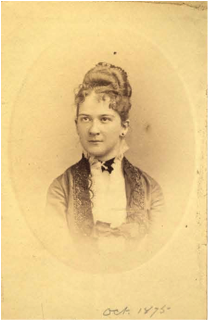Foreword: Mainly out of curiosity and with trickles of unexpressed creativity, I like to design and make Victorian and Edwardian bonnets. They often reflect the handmade traits and fashions I’ve seen in illustrations from Harper’s Bazaar or The Century Magazine, and I try to use authentic fabrics and trims. Researching women of that century is challenging -- they slipped away to become the wife of someone else and quickly lost their self-identity. I try to imagine what an individual’s personality and tastes may have been when writing about them. It is good to think about fashion and their lifestyles, too -- women in long, full dresses -- crossing muddy streets in silk slippers, riding horses sidesaddle, attending dances in drafty ballrooms, and changing several times each day to suit the various occasions.
Each bonnet is dedicated to someone who may not have been famous but who acted on her private beliefs. One of the first bonnets I made was dedicated to Fanny Gibbon. Fanny was the maternal aunt of Nan Moale Smith, and her daughter Fannie was particularly close to Nan as a cousin and as a friend. Nan was "summering" with the Gibbon family at West Point in 1872, and it was likely Fannie who introduced her to Cadet C.E.S. Wood. She harbored a secret crush on the handsome cadet that created more than a few ruffled feelings between the two cousins.
Fanny Gibbon’s Campaign for Women’s Rights
Frances North Moale of Baltimore married 1st Lt. John Gibbon, September 25, 1854. The happy newlyweds spent their first years together at West Point Military Academy where their two little daughters were born, Frances (also “Fannie”) and Katharine (“Katie”). Their daughters were an endless source of joy to the somber officer and his beautiful wife. Fanny and the girls first journeyed west with Captain Gibbon in June 1860 in a mule-drawn army ambulance across the Plains to command Fort Floyd, UT. They travelled on the Oregon Trail, retracing some of Lewis & Clark’s travels, too. A prolific writer and illustrator, Gibbon recorded his family trip for posterity in Adventures on the Western Frontier (Indiana University Press, 1994) He marveled at little Katie’s artwork and her interest in his journals. He noticed that Fanny was becoming a real trooper, too, cooking over a wood fire. She was raised at the Moale family country home “Atamasco” near Owings Mills, MD. There, servants and former slaves cooked all of the meals and tended to the housekeeping, but an Army wife was expected to be adaptable and charming, and above all she should make the best of any situation.
When the nation and the army were torn apart with the surrender of Fort Sumter, the newly promoted Captain Gibbon and Fanny were forced, like many, to choose between families of loyal Democrats in North Carolina & Maryland and his oath to the Union. To fellow officers he was the “most American of Americans.” Fanny Gibbon’s sentiments are unknown. Gibbon was promoted to brevet General during the Civil War and Fanny followed him to some of the camps. Throughout most of the war, Fanny and her children remained in Maryland. Present for the surrender at Appomattox, General Gibbon, as a highly decorated soldier was offered his choice of future commands on the Western Frontier.
The Gibbon family now included a little son John, and they would cross the nation many times in the next 30 years as the general’s career flourished. Officers’ housing improved over the years, too, until at the apex of Gibbon’s career, the General and his family moved as the first residents into an 8,000-square foot Victorian mansion built for the Commander of the Department of the Columbia, headquartered at Vancouver Barracks, in Washington Territory.[1] Fanny entertained to her heart’s delight as important visitors frequented the General’s home for teas, hops, balls and masquerades. U.S. Presidents, Senators, & business magnates travelling West called on John and Fanny Gibbon.
A general’s wife held influential sway over social, ethical and political matters within the Department. Fanny Gibbon and her two daughters supported the women’s right to vote. Upon retirement, John wrote an article for Harper’s Weekly “In Defense of Women’s Right to Vote.” Rumored that his wife and daughter Fannie wrote it, it was common for women to use their famous husband’s name when seeking broad exposure for a hotly debated subject. Like Fanny, John believed in Women’s Rights and but he did not join in his wife’s voting marches and campaigns. While living in Washington Territory (1886-1889), Fanny and all women of majority age enjoyed equal voting rights with registered male voters within the county and local elections. Women shared positions on school boards and paid taxes. They lost this right when Washington Territory became a state but since the state was one of three in the nation to extend community property rights to all men and women, they continued to enjoy independent legal status.
Fanny and John enjoyed a remarkably close companionship throughout their married lives. John passed away February 6, 1896. Fanny died a few years later, and like many 19th century wives the date has not been found.
Bibliography
Gibbon, John. Adventures on the Western Frontier (Indiana University Press, 1994)
___________. Personal Recollections of the Civil War. New York: G.P. Putnam's Sons, 1928.
[1] The house remains open yet today as the grande dame of Officers’ Row in Vancouver, WA, where 21 historic homes have been restored and refurbished for continued use. The Gibbons’ home is known as the “Marshall House.” General George C. Marshall and his wife Katherine lived there after his promotion to general and throughout his first command as department commander.
